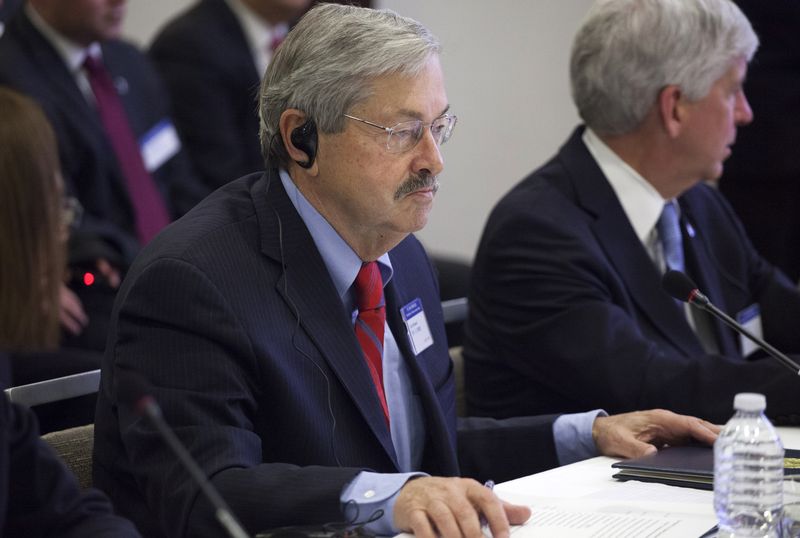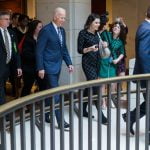Iowa Gov. Terry Branstad will be Trump’s ambassador to China, the Trump campaign confirmed in a call Wednesday morning. On the face of it, the pick seems odd — what would the governor of landlocked Iowa possibly know about China?
Dig a bit deeper, though, and the appointment begins to make a lot more sense. The Iowa governor has worked closely with Chinese officials on issues relating to agriculture, even hosting Chinese President Xi Jinping for a lavish state visit in 2012. Xi returned the favor the next year, inviting Branstad to China as part of a trade delegation. Branstad once struck a $4.3 billion deal with Chinese officials to expand Iowan exports to China.
As a result, Branstad generally takes a more positive view of trade with China than his new boss.
“I know that Donald Trump thinks that the United States has not been very smart and not done a very good job in negotiating the trade deals and I’m sure that we can improve on that. But, that should not mean that we reduce trade,” he told IowaWatch, a state news website, in July. “We ought to be looking at ways we can get a better deal and that we could increase our exports.”
By all indications, Branstad is the kind of person you pick to help you build economic ties with China — not launch trade wars with them, as Trump has threatened on the campaign trail.
“President-elect Trump has selected someone … who wants to grow economic cooperation with China,” says Patrick Cronin, the senior director of the Asia-Pacific Security Program at the left-leaning Center for a New American Security. “Is that a smart move? Yeah.”
So what does the Branstad pick mean for the Trump administration’s approach to China? It’s actually a bit tough to say, especially in the wake of Trump’s precedent-defying call with the president of Taiwan last week. It could be that the president-elect’s team is being canny, signaling to China that it’s open to economic cooperation but also willing to take a hard line on key issues like Taiwan if necessary.
It also could be that there’s no bigger plan at all — that Trump is just picking a high-profile campaign supporter from a swing state who he knows has some knowledge about China. We just can’t be sure.
Branstad is more pro-trade than Trump
/cdn0.vox-cdn.com/uploads/chorus_asset/file/7603803/489588606.jpg)
According to the New York Times, Branstad and Xi have been acquainted for a very long time (though Branstad doesn’t speak Mandarin):
They met in 1985, when Mr. Branstad was serving his first term as governor of Iowa and Mr. Xi was a 31-year-old rural official in Hebei Province, studying modern American agriculture, including hog and corn farming in Iowa.
It’s not clear exactly how much the two men have spoken over the years. But it is clear that since assuming their recent offices, the two men have been in touch.
“There’s probably a close rapport — if not with Xi and Branstad, at least Branstad and some of the key people around Xi,” Cronin explains.
This has less to do with decades-old meetings and more to do with modern Chinese policy. According to Cronin, Xi has made a point of connecting with foreign political officials with influence over economic sectors important to Chinese interests. In this case, the issue is agriculture: China doesn’t grow enough food to feed its own people, and the US is the largest single source of Chinese food imports.
In Branstad, then, the US is getting an ambassador who sees US relations with China through a positive, primarily economic lens. He’s made few public comments indicating hawkish positions on Taiwan or the South China Sea, instead seeing China as a business partner and a market for American goods.
“We have a great trading relationship with [China],” Branstad said in a 2012 interview on Chinese state TV. “I think Iowa can play a role in helping improve the relations between our two countries — and, hopefully, build on the great expansion we’ve had in trade.”
This is a reassuring sign for China — and the global economy.
During the campaign, Trump threatened to punish China for “taking American jobs” by slapping a 45 percent tariff on Chinese imports to the US. This, as my colleague Zeeshan Aleem documents, could well cause China to put tariffs on US goods as well — provoking what economists call a “trade war,” where both sides attempt to punish the other by keeping their goods out.
Given how central the US and China are to each other’s economies, a trade war would lead to much slower growth, if not outright recessions. That would be bad for the US and China — the world’s two largest economies — and for other countries that might want to sell to them.
Branstad, given his positive view of US-Chinese trade and close links to the establishment in Beijing, would likely be a voice against such a move. And US ambassadors to China do typically wield real influence, especially when it comes to bilateral economic ties.
What on earth is Trump’s China policy going to be?
/cdn0.vox-cdn.com/uploads/chorus_asset/file/7603819/628142168.jpg)
The past week of Trump activity on China has been very confusing.
On the one hand, you have the call to Taiwanese President Tsai Ing-wen. No American president has spoken to a Taiwanese leader face to face since 1979, because the US has consistently refused to recognize Taiwan as an independent nation rather than as a part of China. America’s goal is to preserve a working relationship with China, which feels very, very touchy about American relations with the breakaway island. The call, which apparently had been in the works for months, was a direct slap in the face to Xi and the Chinese leadership, signaling a newly aggressive US stance toward relations with Beijing.
On the other hand, you have the Branstad appointment — which could be a small sign that Trump is backing away from his protectionist views on trade with China. Just days after escalating tensions with Beijing, in other words, Trump could now be backing away from them.
What’s going on?
It could all be part of deliberate carrot-and-stick strategy on Trump’s part, designed to enhance US bargaining leverage with Beijing by showing that the US is open to cooperation but, at the same time, willing to punish Beijing if it negotiates in bad faith or harms US interests.
Trump doubled down on the propriety of the Taiwan call afterward in some tweets, taking a hard line on China’s right to dictate US diplomacy. It’s possible the Branstad appointment is Trump’s attempt to balance his earlier confrontational approach with something signaling more openness.
The other possibility is that Trump just picked someone he liked.
Branstad endorsed Trump in May, and appeared on the campaign trail with him several times. Branstad’s son Eric was Trump’s campaign director in Iowa. Gov. Branstad publicly defended Trump during the campaign’s “grab ’em by the pussy” nadir in mid-October, launching a pro-Trump stump tour even as the public evidence that Trump had committed a series of sexual assaults mounted. Trump then won Iowa — and may feel some gratitude to Branstad as a result.
And Trump has shown a willingness to be influenced on China policy. The Taiwan call appears to be the result of a lobbying campaign led by former Sen. Bob Dole, who currently works at a lobby shop employed by the Taiwanese government. Dole accomplished this feat simply by reaching out to Trump’s people and making Taipei’s case.
So it could be, then, that Trump has come to like Branstad, knows he has experience with China, and decided to award a loyal follower without giving a lot of thought to whether the nominee’s views on China line up with his own. Given Trump’s unprecedented lack of knowledge about foreign affairs, and his willingness to abruptly abandon long-held positions, this theory is very hard to rule out.
[Source:-Vox]








